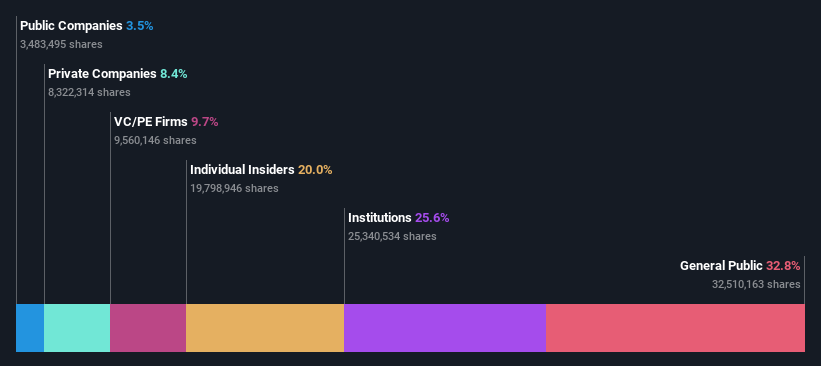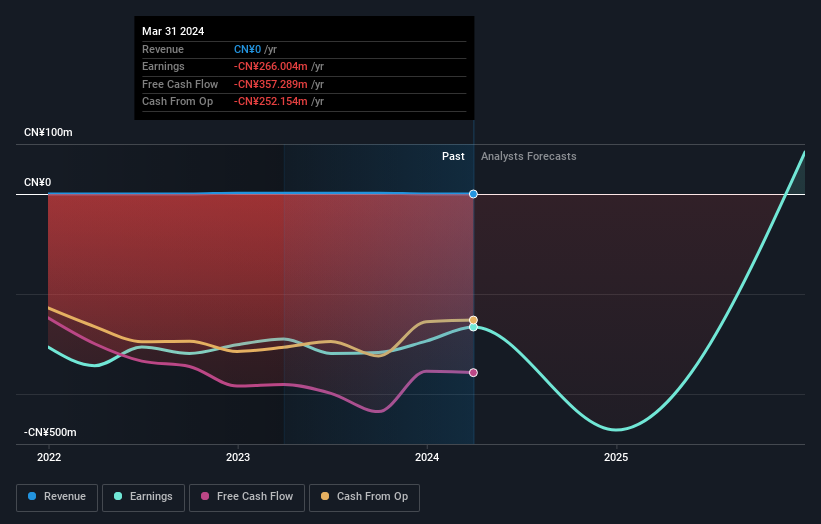Hinova Pharmaceuticals Inc.'s (SHSE:688302) market cap touched CN¥2.7b last week, benefiting both retail investors who own 33% as well as institutions

Key Insights
- Significant control over Hinova Pharmaceuticals by retail investors implies that the general public has more power to influence management and governance-related decisions
- The top 13 shareholders own 51% of the company
- 20% of Hinova Pharmaceuticals is held by insiders
If you want to know who really controls Hinova Pharmaceuticals Inc. (SHSE:688302), then you'll have to look at the makeup of its share registry. The group holding the most number of shares in the company, around 33% to be precise, is retail investors. That is, the group stands to benefit the most if the stock rises (or lose the most if there is a downturn).
Following a 13% increase in the stock price last week, retail investors profited the most, but institutions who own 26% stock also stood to gain from the increase.
Let's take a closer look to see what the different types of shareholders can tell us about Hinova Pharmaceuticals.
See our latest analysis for Hinova Pharmaceuticals

What Does The Institutional Ownership Tell Us About Hinova Pharmaceuticals?
Institutional investors commonly compare their own returns to the returns of a commonly followed index. So they generally do consider buying larger companies that are included in the relevant benchmark index.
Hinova Pharmaceuticals already has institutions on the share registry. Indeed, they own a respectable stake in the company. This implies the analysts working for those institutions have looked at the stock and they like it. But just like anyone else, they could be wrong. If multiple institutions change their view on a stock at the same time, you could see the share price drop fast. It's therefore worth looking at Hinova Pharmaceuticals' earnings history below. Of course, the future is what really matters.

Hedge funds don't have many shares in Hinova Pharmaceuticals. The company's CEO Yuanwei Chen is the largest shareholder with 13% of shares outstanding. Meanwhile, the second and third largest shareholders, hold 9.7% and 3.9%, of the shares outstanding, respectively.
Looking at the shareholder registry, we can see that 51% of the ownership is controlled by the top 13 shareholders, meaning that no single shareholder has a majority interest in the ownership.
While studying institutional ownership for a company can add value to your research, it is also a good practice to research analyst recommendations to get a deeper understand of a stock's expected performance. While there is some analyst coverage, the company is probably not widely covered. So it could gain more attention, down the track.
Insider Ownership Of Hinova Pharmaceuticals
The definition of an insider can differ slightly between different countries, but members of the board of directors always count. Management ultimately answers to the board. However, it is not uncommon for managers to be executive board members, especially if they are a founder or the CEO.
I generally consider insider ownership to be a good thing. However, on some occasions it makes it more difficult for other shareholders to hold the board accountable for decisions.
Our most recent data indicates that insiders own a reasonable proportion of Hinova Pharmaceuticals Inc.. Insiders own CN¥540m worth of shares in the CN¥2.7b company. We would say this shows alignment with shareholders, but it is worth noting that the company is still quite small; some insiders may have founded the business. You can click here to see if those insiders have been buying or selling.
General Public Ownership
With a 33% ownership, the general public, mostly comprising of individual investors, have some degree of sway over Hinova Pharmaceuticals. While this group can't necessarily call the shots, it can certainly have a real influence on how the company is run.
Private Equity Ownership
With a stake of 9.7%, private equity firms could influence the Hinova Pharmaceuticals board. Some might like this, because private equity are sometimes activists who hold management accountable. But other times, private equity is selling out, having taking the company public.
Private Company Ownership
We can see that Private Companies own 8.4%, of the shares on issue. Private companies may be related parties. Sometimes insiders have an interest in a public company through a holding in a private company, rather than in their own capacity as an individual. While it's hard to draw any broad stroke conclusions, it is worth noting as an area for further research.
Public Company Ownership
It appears to us that public companies own 3.5% of Hinova Pharmaceuticals. It's hard to say for sure but this suggests they have entwined business interests. This might be a strategic stake, so it's worth watching this space for changes in ownership.
Next Steps:
I find it very interesting to look at who exactly owns a company. But to truly gain insight, we need to consider other information, too. Consider for instance, the ever-present spectre of investment risk. We've identified 3 warning signs with Hinova Pharmaceuticals (at least 1 which doesn't sit too well with us) , and understanding them should be part of your investment process.
But ultimately it is the future, not the past, that will determine how well the owners of this business will do. Therefore we think it advisable to take a look at this free report showing whether analysts are predicting a brighter future.
NB: Figures in this article are calculated using data from the last twelve months, which refer to the 12-month period ending on the last date of the month the financial statement is dated. This may not be consistent with full year annual report figures.
Valuation is complex, but we're here to simplify it.
Discover if Hinova Pharmaceuticals might be undervalued or overvalued with our detailed analysis, featuring fair value estimates, potential risks, dividends, insider trades, and its financial condition.
Access Free AnalysisHave feedback on this article? Concerned about the content? Get in touch with us directly. Alternatively, email editorial-team (at) simplywallst.com.
This article by Simply Wall St is general in nature. We provide commentary based on historical data and analyst forecasts only using an unbiased methodology and our articles are not intended to be financial advice. It does not constitute a recommendation to buy or sell any stock, and does not take account of your objectives, or your financial situation. We aim to bring you long-term focused analysis driven by fundamental data. Note that our analysis may not factor in the latest price-sensitive company announcements or qualitative material. Simply Wall St has no position in any stocks mentioned.
Have feedback on this article? Concerned about the content? Get in touch with us directly. Alternatively, email editorial-team@simplywallst.com
About SHSE:688302
Hinova Pharmaceuticals
A clinical-stage pharmaceutical company, engages in the development and production of therapeutics for cancers and metabolic syndromes.
Flawless balance sheet low.

